
|
Please report any broken links or trouble you might come across to the Webmaster. Please take a moment to let us know so that we can correct any problems and make your visit as enjoyable and as informative as possible.
All images in this section are taken from the cruise book. Narrative has been transposed and added to the photos where appropriate.
"Out to sea, again, the ship left for New York City. The first load of troops boarded. The ship joined a huge armada for invasion maneuvers off the coast of New River, North Carolina. What followed was a month of hell. The 'West Point', 'Wakefield', and 'Mount Vernon' were tested for their effectiveness as invasion transports. Hours, stretching into weeks, were spent shuffling troops from ship to shore. Boat crews worked ceaselessly, coming aboard every 36 to 40 hours to fall exhausted in their bunks, only to be sent out again. Fresh water was at a premium. Salt water was put through the showers; fresh water was rationed for drinking.
Tired, sun blistered, and disgusted, the ship returned to New York in late August to debark troops. After a lay over in Hampton Roads, the ship proceeded to Boston. While the crew investigated the city, gun emplacements were installed aboard the 'Mount Vernon'.

|
Scolley Square and Beacon Hill did not realize they were saying 'Goodbye' to the crew, not to see them for another two years. But the men had put two and two together. When the ship left Boston during the evening traffic rush, the men were not to surprised. The exact nature of their cruise was not revealed to them until they were well underway. Without a source of barside scuttlebutt, the ship's company arrived in Halifax in the same condition as the weather: a complete fog. The ship remained at anchor, joining the chorus of fog horns.
Speculation had been high regarding the appearance of the land, interest having been concentrated on bright lights. With long faces, the crew saw the bleak, weather-beaten countryside appear through the clearing weather. The Indians who lived along the shore greeted the ship in the true frontier style by letting go a few war whoops. That having enlivened the crew, they were disappointed again, when instead of a rip-roaring frontier town, sleepy Halifax appeared around the bend. On liberty, the men found the town as quiet as they had feared. There was no place to go to uphold the reputations. After a few beers, a few souvenirs, and a walk on the main street, they relaxed and listened to the town's only excitement. In 1917, a French ammunition ship had rammed a Norwegian freighter. The excitement had been enough to last the city until the end of time.

|
Back at the ship, British Tommie, shivering in the cold, awaited their time to come aboard. Some were prepared to not walk back, they had their bicycles with them.
When, at the end of the week, the ship pulled out, she became part of a convoy including the 'West Point','Wakefield','Leonard Wood','Dickman','Hunter Liggett','Ranger','Orizaba','Astoria','Vincennes','Quincy','Cimmeron','Annapolis' and escorting destroyers.
The British and the Americans soon became friends. International understanding were worked out by the mutual good nature of both parties. Some Tommies were on a working party which worked beyond their dinner hour. Their Commanding Officer had arranged with the Paymaster Commander McCray to have them served tea after the job was finished. When they arrived in the mess hall and found the tea, milk, and sugar, they hesitated. The chief commissary steward, noting their hesitation asked, 'Why?'
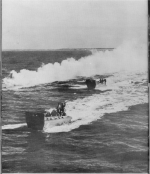
| 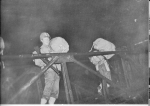
|
As the weather became warmer and the novelty of passengers began to wear, rope yarn Sundays were started--on Wednesday afternoons. Boxing matches, arranged by Chaplain Martin took part of the time and amateur shows finished the day. Once the English put on a skit for the show. The American evaluation of the British brand of humor is well known.
The course drew the ship through the passage called the Dragon's Mouth into the harbor of Port au Prince, Trinidad. Ship's company was intrigued by their first close up of a tropical island. They discussed the mysteries beyond the mountains, the pitch lake, and the liquor. Ten percent of the crew was allowed ashore. Those left aboard tried swimming off the fan tail. Divers made all manner of attempts at diving. Pulling themselves up the boat falls proved too strenuous in the tropical heat.
Mail came aboard. Top priority of morale boosters is mail. Whether after a six months' trip around the world or a week's crossing of the Atlantic, nothing gives the uplift of news or the sugar report. Carl Mutschler CMaM has been getting the mail through to the ship's company with the least possible strain for quite some time. Helping, have been Hyland, Hoyer, Shields, and half the Marine detachment."

| 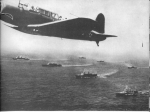
| 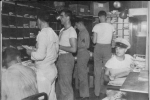
| 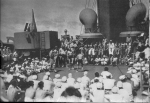
|
Dire threats of impending happenings were casually dropped about the ship as the convoy steamed south. The ship was approaching the Equator. A small group walked the decks with lordly airs. All the loyal shelbacks prepared to pay homage to His Majesty, King Neptune. The polliwogs discovered that they were greater in umber and decided to do something about it. They tried! One morning Lassitar, the pharmacist's mate with the salesman's soul sneaked around the corner with a new hair cut. One half of his hair was cut scalp high. He reported that dental technician Bunting and himself had spent the night in the brig. Other polliwogs looked over their shoulders more often as they wandered through the darkened passageways. The librarian Revanel had published statistics proving that 'Crossing the Line' had been fatal to some.
Watch standers appeared in uniforms with subtle changes. The First Lieutenant, Commander Wilcox wore diving shoes, raincoat, and fire helmet and carried fire axes as accessories. Some of the other officers reported to the bridge to test the visual qualities of nozzles in place of binoculars.
At 1300 the next day, King Neptune came aboard and held court. Salt water flowed freely. Arms, as well as rumps, ached from the swinging of paddles. Lieut. (jg) Wilder caught the back sweep of a paddle and spent several days in sick bay. Stitches closed the would in a sailor's scalp. Initiates begged the immediate installation of the extra high mess hall tables (without benches)."
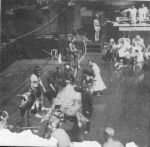
| 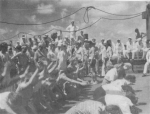
| 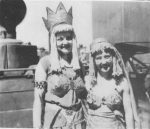
| 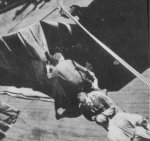
| 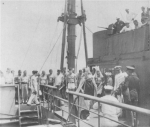
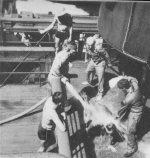
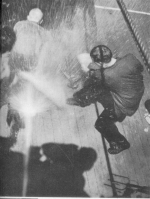
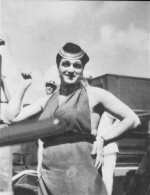
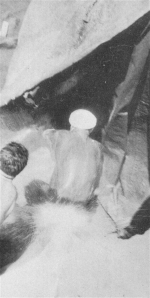
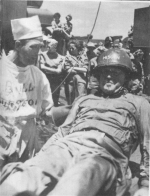
|
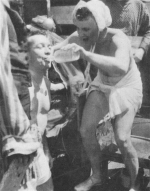
| 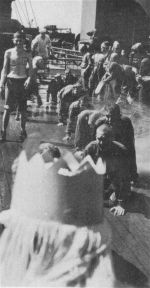
| 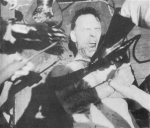
| 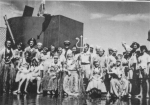
|
| Comments, Suggestions, E-mail Webmaster. |
|
This page is created and maintained by Gary P. Priolo |